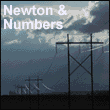forum
library
tutorial
contact

Infinity and Beyond
by Charles Seifefrom Zero - The Biography of a Dangerous Idea, c2000
|
the film forum library tutorial contact |

|
Infinity and Beyondby Charles Seifefrom Zero - The Biography of a Dangerous Idea, c2000 |
However, if we do discover a complete theory, it should in time be understandable in broad prinicple by evryone, not just a few scientests. Then we shall all, philosophers, scientists, and just ordinary people, be able to take part in the discussion of the question of why it is that we and the unverse exist. If we find the answer to that, it would be the utimate triumph of human reason -- for we would know the mind of God."
Zero is behind all of the big puzzles in physics. The infinite density of the black hole is a division by zero. The big bang creation from the void is a division by zero. The infinite energy of the vacuum is a division by zero. Yet dividing by zero destroys the fabric of mathematics and the framwork of logic and threatens to undermine the very basis of science.In Pythagoras's day, before the age of zero, pure logic reigned supreme. The universe was predictable and orderly. It was built upon rational numbers and implied the existence of God. Zeno's troubling paradox was explained away by banishing infinity and zero from the realm of numbers.
With the scientific revolution, the purely logical world gave way to an empirical one, based upon observation rather than philosophy. For Newton to explain the laws of the universe, he had to ignore the illogic within his calculus -- an illogic caused by a division by zero.
Just as mathematicians and physicists managed to overcome the division-by-zero problem in the calculus and set it once more upon a logical framework, zero returned in the equations of quantum mechanics and general relativity and, once again, tainted science with the infinite. At the zeros of the universe, logic fails. Quantum theory and relativity fall apart. To solve the problem, scientists set out to banish zero yet once more and unify the rules that govern the cosmos.
If scientists succeed, they will understand the laws of the universe. We would know the physical laws that dictate everything to the edges of space and time, from the beginning of the cosmos to its end. Humans would understand the cosmic whim that created the big bang. We would know the mind of God. But this time, zero might not be so easy to defeat.
The theories that unify quantum mechanics and general relativity, that describe the centers of black holes and explain the singularity of the big bang, are so far removed from experiment that it might be impossible to determine which are correct and which are not. The arguments of string theorists and cosmologists might be mathematically precise and at the same time be as useless as the philosophy of Pythagoras. Their mathematical theories might be beautiful and consistent and might seem to explain the nature of the universe -- and be utterly wrong.
All that scientists know is the cosmos was spawned from nothing, and will return to the nothing from whence it came.
The universe begins and ends with zero.
Although I disagree with this conclusion, I highly recommend the book
learn more on topics covered in the film
see the video
read the script
learn the songs
discussion forum
